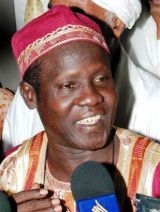SPLM urge govt to ease south Sudan restrictions
By Opheera McDoom
JUBA, Sudan, April 10 (Reuters) – Southern Sudan’s former rebels arrived in the government-held south for the first time in two decades and urged authorities on Sunday to ease war-time restrictions quickly as proof that peace had arrived.

|
|
James Wani head of the Sudan Peoples Liberation Movement delegation speaks to the media after arriving at Khartoum airport Sunday, April 3, 2005.. |
After years of failed attempts to gain control of south Sudan’s main town of Juba, former Sudan People’s Liberation Movement rebels finally arrived in the garrison town late on Saturday night — this time greeted with hugs and not bullets.
“I’m coming to tell the people of southern Sudan that this agreement has come and needs their support,” said SPLM Secretary-General James Wani, who is heading the delegation.
The SPLM signed a peace deal with Khartoum to end Africa’s longest civil war on January 9, but implementation has been slow. The former rebels were due to arrive in Khartoum two weeks after the date of signing, but were delayed as they made preparations and only came last week.
Wani said government restrictions in Juba had to be lifted to show the people that peace had finally arrived.
“The agreement is really kind of stalled and there is some degree of stagnation,” he said. “We must make a striking difference to our people so that they can actually see that we are opening a new page of freedoms , and of peace.”
Wani said roads must be opened to help trade and bring down prices in Juba, an island of government control surrounded by SPLM territory. Checkpoints surrounding the town needed to be removed, a midnight curfew lifted, and freedom of movement must begin, as per the peace deal, he added.
Wani was speaking only 200 metres (yards) away from a dilapidated petrol station decimated by the SPLM in an attack in the 1990s, where locals said 10 people were killed. Wani fled his hometown of Juba more than 20 years ago, while being chased by the Sudanese army.
“It was a nasty day my house was surrounded by three lorries full of army,” he said, adding he narrowly escaped to Kenya with his life. “But I’m really happy to be at home.”
The southern civil war broadly pitted the Islamist Khartoum-based government against mainly Christian and pagan southern rebels, complicated by issues of oil, ethnicity and ideology. It claimed more than 2 million lives, mostly from famine and disease and forced at least 4 million from their homes.
BARE CAPITAL
Juba, which has running water only for a few, limited electricity provided by 3 large generators, and little other infrastructure, is to be the future capital of southern Sudan when government troops redeploy to the north, a process due to be completed in 2.5 years.
Wani, a small, jolly figure dressed in colourful traditional costume, said redeployment had begun slowly but the government had to begin allowing road clearance to start, which was key to allowing the development in the south.
Donors are to meet in Norway on Monday where the United Nations will underline an appeal for $2.6 billion in 2005 to support the southern peace deal with much-needed development and humanitarian assistance to hundreds of thousands of southerners returning home after years in absence.
Juba’s people welcomed the SPLM arrival as a sign that much-needed help was finally on their way and as a symbol of freedom from years of hardship and war.
“We needed them here so much sooner because our people have suffered,” said accountant Damian Azomun, 36. “I will join them straight away — now we will have stability and can make our lives better.”
